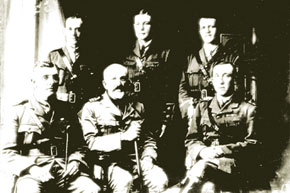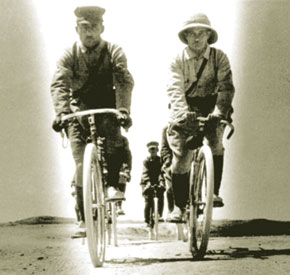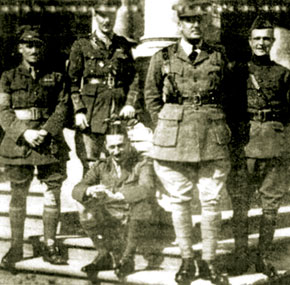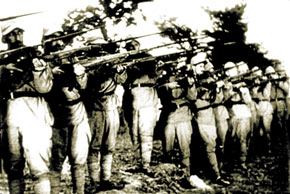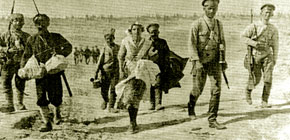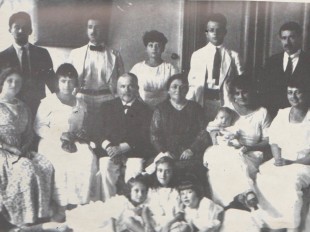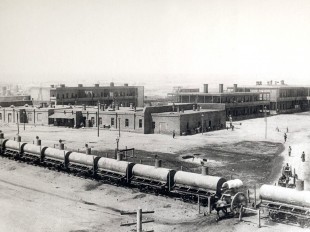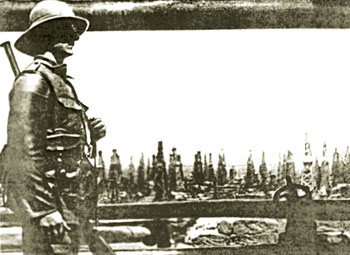 At the end of World War I, Britain and France signed a convention, dividing up their geographical spheres of influence. Under the convention the South Caucasus and Central Asia were included in the British zone of influence, while Crimea, Ukraine and Bessarabia were in the French zone. Even after Gen Dunsterville´s unsuccessful campaign in the South Caucasus, the demarcation of "spheres of influence" was again confirmed at a conference of the British war cabinet on 13 November 1918. The British government, not wishing to postpone the second entry of Allied forces into Baku, got permission at the Entente´s Supreme Council to bring troops into Baku no later than November 1918. But it was necessary first of all to consider a great number of questions related to the security of the Allied forces entering Baku and the South Caucasus. The political, economic, interethnic and criminal situation in Baku was critical, even explosive. The difficult situation in the South Caucasus really was a serious pretext for the beginning of the wide-scale military occupation of Azerbaijan by Britain and its allies, all the more so since the decision had already been made.
At the end of World War I, Britain and France signed a convention, dividing up their geographical spheres of influence. Under the convention the South Caucasus and Central Asia were included in the British zone of influence, while Crimea, Ukraine and Bessarabia were in the French zone. Even after Gen Dunsterville´s unsuccessful campaign in the South Caucasus, the demarcation of "spheres of influence" was again confirmed at a conference of the British war cabinet on 13 November 1918. The British government, not wishing to postpone the second entry of Allied forces into Baku, got permission at the Entente´s Supreme Council to bring troops into Baku no later than November 1918. But it was necessary first of all to consider a great number of questions related to the security of the Allied forces entering Baku and the South Caucasus. The political, economic, interethnic and criminal situation in Baku was critical, even explosive. The difficult situation in the South Caucasus really was a serious pretext for the beginning of the wide-scale military occupation of Azerbaijan by Britain and its allies, all the more so since the decision had already been made.ADR GOVERNMENT WELCOMES THE BRITISH
Only the political intuition of the leaders of the ADR (Azerbaijan Democratic Republic) allowed them to reorient their policy quickly and to go for a rapprochement with the Allied command in Iran. Taking this decision would give Azerbaijan a chance to avoid inclusion, as an ally of Ottoman Turkey, in the capitulation of the Triple Alliance countries. So the leaders of the ADR as a priority began to look for ways to develop relations with the British military command, based in northern Iran, whose army was ready to invade Azerbaijan.It was, therefore, necessary immediately to start negotiations. One of the pretexts for the acceleration of the start of the negotiating process was a meeting of Muslims from the Lankaran area with the British consul on 14 November 1918. The Muslims asked for the restoration of public peace and law and order in the area and "to be saved from the robbery of Avetisov’s Bolshevik- Dashnak detachment". The consul promised to report this to the commander of the British army in Enzeli, where he was heading for negotiations with a delegation of the ADR government made up of A. Agayev, M. Rafiyev and N. Usubbekov.
On the instruction of the government, the members of the Azerbaijani delegation made a statement to the British command that they "do not object to the entry of a detachment of Allied forces into Baku on 17 November under the command of Your Excellency". They also reported that the ADR government was taking all steps "to receive and accommodate the coming troops". Gen Thomson answered: "I am grateful to you and quite sure that collaborating in this way our mutual relations will remain quite satisfactory."
The results of the negotiations became known on 16 November and the government held a closed sitting in Baku, which heard a report about the beneficial results of the talks with the Allied forces. The sitting discussed an "Appeal" from the head of government and minister of internal affairs to the population. The "Appeal", which was declared in the morning of 17 November, said: "As the result of the negotiations between the Azerbaijan Government and representatives of Allied forces in Enzeli, agreement was reached with Gen Thomson under which this morning, 17 November, a detachment of Allied forces led by Gen Thomson will march into the capital of Azerbaijan, Baku. This entry of Allied forces is not a hostile act, capable of violating the independence and territorial integrity of Azerbaijan. All the state and social institutions will function normally, as before. The government has taken every step to maintain law and order in the city. The government calls on all citizens to remain calm and orderly and to receive the Allied detachment in a friendly fashion." The members of the delegation should be given their due here, as they understood that the question of restoring and maintaining law and order in Baku would be one of the key issues in the negotiating process and further cooperation.
Successful landing, ensuring the security of his troops, restoring public security in the city, eliminating extremist forces and terrorist organisations, tackling crime - all this worried Gen Thomson very much. He understood that his mission was not a colonial capture or military invasion, but an absolutely new policy in world practice. In the new conditions, this was a peacemaking mission, if the term can be used, especially after the declaration by US President Woodrow Wilson of his famous Fourteen Points concerning the self-determination of nations and the settlement of disputed territorial questions.
Taking all this into consideration, the general scrupulously gathered experienced and competent officers under his command. One of the officers was Col Cockerell, chief of the British special colonial police in Persia. Gen Dunsterville wrote in his memoirs that when he was in Baku he had missed the then Capt Cockerell very much and that he had always thought highly of him. In one of his reports to the supreme command Dunsterville said of Cockerell: "My chief of military police, Capt Cockerell, reaches the last degree in unsurpassed skill." At that time Col Cockerell’s police authority stretched from Persia to Iraq. On the eve of his arrival in Baku Gen Thomson considered various plans for bringing troops to Baku. Only after long consideration did he choose an option that would be safe both for the British and Baku citizens.
On 17 November 1918 at about one o’clock in the afternoon the ships Kruger, Tula and Evelina sailed in to Baku port. They were carrying a British-French-American military mission of 1,000 British and 800 Indian soldiers and police and also representatives of the Allied powers of Britain, France and the USA. A guard of honour was held to welcome the Allied forces on the quayside at Baku port. Gen Thomson received a report from the commander of the Baku garrison. Representatives of the Allied forces with a small guard, led by Col Cockerell and the ADR’s minister of internal affairs, Behbud aga khan Javanshir, walked from the quayside to the railway station square. A ceremonial meeting was held on the station square, where a large number of people had gathered. The acting minister of foreign affairs, Adil Khan Ziatkhanov, greeted the general: "The government has authorised me to greet in the person of Your Excellency the representative of the great European powers who has come to the capital of Azerbaijan. Henceforth, for mankind that has shed so much blood a new era of peaceful public work, based on universal solidarity, is beginning. The young Azerbaijan nation, that has survived so many shocks in its state life, has only just set out on the road of independence. Our people are resolved in the firm and unshakable hope that their elder brothers, the European nations with their ancient civilisation, will not refuse to accept them into their family for the sake of lofty and sacred ideals."
The general answered: "I congratulate you on the end of the war. As commander of the British, French and American Allied forces I inform you that, according to the agreement with Turkey, we have come here to take the place of the Ottoman forces that have been guarding your territory until now. We have no intention of interfering in your internal affairs either now or in the future. I hope that with your cooperation everything will be for the better." It is difficult to imagine that at that complex time the mission of the allies in the South Caucasus, and particularly in Baku, could have taken a direction other than restoring and maintaining law and order. Even the official point of view of the country’s political leaders proves this.
The chairman of the government, Fatali Khan Khoiski, gave an exact description of the mission in his speech at the opening of parliament on 7 December 1918, reprinted by the Azerbaijan newspaper: "The allies have come here to serve the cause of maintaining law and order."
The main mission of the Allied powers had, therefore, already been determined before their landing - the establishment of an administrative-police regime with the purpose of overcoming political, criminal and transnational crime.
RESTORING PUBLIC ORDER
On his first day in Baku, 17 November, Maj-Gen Thomson announced "A binding decree on the introduction of martial law in Baku". The decree said:1. Baku is declared to be under martial law from 12 o’clock midday on 17 November 1918. I, the undersigned, Maj-Gen Thomson, will be in charge of it.
2. During martial law I, the undersigned, will be military governor of Baku.
3. Col F. P. Cockerell is appointed commissar of police of the Allied powers in Baku.
After the official declaration of the introduction of martial law, Gen Thomson stressed many times in his statements the police nature of his mission: "On behalf of the Allies Baku is occupied by British troops. The Allies cannot return home until they have restored law and order..." "My duty is to bring calm to the Baku district." "We are coming to you with just one aim, to restore public peace..." "I will temporarily establish local and city administrations and all our efforts will have only one purpose: the restoration of law and order." "Martial law has been declared in Baku and will remain in force until the civilian authorities are strong enough to release the troops (police - author’s note) from their responsibility for maintaining law and order."
On 19 November 1918 a "binding decree" was announced by the commander of Allied forces in Baku, Maj-Gen Thomson, "On punishment for the violation of martial law" in addition to the decree on the introduction of martial law. "To supervise implementation of the aforementioned decree, I appoint Col F.P Cockerell commissar of police of the Allied powers in the city of Baku, the latter acts in my name."
The instruction on the appointment of Cockerell as police commissar was issued on 19 November 1918 and 10 days later a temporary police commissariat of the Allied powers had been organised. For the practical implementation of this multi-faceted work to restore law and order and public security Gen Thomson charged Col Cockerell with the organisation of an office, which became known as the "special office". All the daily information about events in the city had to be delivered to this "special office" of the Police Commissariat. The "special office" consisted of the chief commissar, his deputy and the manager of the office. The office was in charge of both military and civilian issues. The military issues were: the security of the British military contingent, its accommodation, discipline and observation of the rules of behaviour for the
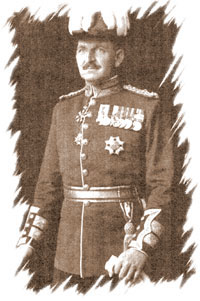
Lt-General Sir William Thomson KCMG, CMG, CB, MC, Legion of Honour,
Class of the White Eagle (1878 - 1963) Commander, North Persia force 1918,
Commander, British troops in Trans-Caucasia 1919
The civilian issues included maintaining law and order in the city, tackling crime, collecting weapons from the population, guarding the oil fields, price control in the city’s markets, tackling excessive prices for foodstuffs, censorship and registration of all newspapers published in the city, implementation of a passport regime, supervision of assemblies, meetings, conferences, marches, theatre shows, cinema, circuses, brothels and restaurants, prevention of the illegal carrying and use of weapons, supervision of trade union, worker and youth organizations, re-registration of trade and commercial associations, public health, etc.
What manpower and material and technical resources did the temporary Police Commissariat have? Unfortunately, there is no precise information about the number of policemen. However, it is known that the first part of the military contingent that came to Baku consisted of 2,000 men, which included military police subdivisions. By roughly the middle of January the military contingent in Baku consisted of 5,000 men, about 2,000 of whom were police forces.
What kind of communications and transport did the British police use? Communication inside the city was by the urban telephone network, while police chiefs, police stations and the Commissariat communicated via military field telephones. As for transport, the command of the Allied forces and the police commissar used cars from the government garage. The other British officers, including police officers, travelled about the city mostly by city phaetons paid for with cash from the united Allied forces HQ.
The British also used the railway in Azerbaijan, especially to travel to Georgia and Batumi. The British police widely used bicycles as a means of transport. The British troops and police had at their disposal British-made Triumph motorbikes and aeroplanes. The police are known to have patrolled the Absheron coast in launches, together with the military. There are also records of the Allied command and British police using armoured cars.
DE-NATIONALISATION
The declaration of martial law, the allocation of forces and resources, the re-subordination of all the Baku police to the temporary Police Commissariat and the removal of all armed units from Baku, thereby depriving all the extremist and destructive reactionary forces fighting against ADR policy of their legal position, formed the first stage of the British police’s work. After this, they moved to the next stage - restoring law and order and maintaining social stability in Baku. And with this goal in mind MajGen Thomson gave the police commissar more powers of a social and legal character, in addition to the powers listed above.The decree on the de-nationalisation of the oil industry, fleet, housing and other installations presented the Azerbaijan government with serious problems, especially in the process of restoring property rights. After the Baku Soviet’s declaration in spring 1918 of the nationalisation of all industrial and other facilities, some Muslim property owners had had to emigrate, while others on pain of death had given up their property to the Baku Soviet. At that time practically all the foreign firms and companies had had to leave Baku. Part of the national bourgeoisie had moved to Turkey and Iran, while the most politicised part went to Georgia and Ganja.
The move of the ADR government to Baku in September 1918 created favourable conditions for the de-nationalisation of industrial property and its return to its rightful owners. The arrival of the British helped this process. There is no doubt that the temporary Police Commissariat played a significant role in this. Its task was not only to provide safe keeping of these facilities, but to supervise their registration, investigate cases and give judgement on the return of facilities to their rightful owners.
At the same time the Police Commissariat was authorised to deal with the regulation of the export of oil and oil products from Baku. It was by decision of the Police Commissariat that the Baku Oil Producers Congress passed a resolution on 24 November 1918 to set up the Bureau for the Sale of Oil and Oil Products. The British Oil Administration was set up with the same aim and collaborated closely with the Commissariat.
On the orders of the police commissar, the Commissariat was to receive information about the availability of fuel reserves in Baku. Col Cockerell knew that Baku with its oil reserves was the largest oil base in the world. Reserves of crude oil were 30 million poods (318 million kilograms), fuel oil 11 million poods (176 million kilograms), kerosene 11 million (176 million kilograms) and different kinds of oil 9 million poods (81 million kilograms).
Of course, protecting this "store" was objective No 1 for the British, especially as the colonel was aware of the remarks of the chairman of the British Bibi-Heybat oil trust, Allen, who in December 1918 declared that, "...the Russian oil industry, widely financed and properly organised under British leadership, could be a precious acquisition for the British empire."
From their very first days in Baku the British command declared that the Absheron oil fields would be under the guard of British troops and police. A very strict regime was introduced to guard all the oil facilities. A security zone was announced within a radius of 15 versts (almost 16 km) from the centre of the oil fields. The British police and the Balahani-Sabunchi police station jointly guarded the oil fields. Unlawful intrusion into the "control zone" was punished by the laws of wartime, even by shooting.
The Police Commissariat came up against serious problems as they sorted out cases to do with the return of property to its legal owners, especially with disputes over flat ownership. Therefore, the Allied command and the ADR Ministry of Internal Affairs set up an apartments commission under the chairmanship of a British officer.
SOCIAL PROBLEMS
The ADR government and British command, in the shape of the temporary Police Commissariat, found mutually beneficial contacts as they cooperated, especially on housing and communal problems. The centre of this integration was quite an authoritative body, the Centrehouse.The Centrehouse had district committees. They were divided into house committees. The house committees dealt with population registration, supervised public health, maintained law and order on the streets especially at night, and monitored possible seats of fire.
All these bodies of the Centrehouse closely cooperated with the Police Commissariat. An interesting case at the time proves this.
At one time the Centrehouse had asked the City Council to give food assistance to the poor, but the request had been refused because of lack of funds. The representatives of the Centrehouse then approached the command of the Allied forces and Gen Thomson personally, who did not procrastinate but ordered the Police Commissariat to give out a considerable part of the food from the reserves of the Allied forces. At that time there was a Central Food Bureau at the Police Commissariat, which was led by Maj Inwood.
The beginning of 1919 was very hard for the ADR government, especially in terms of food supply for Baku. The police commissar suggested to the command that a food reserve fund be established. The Police Commissariat was given the task of supervising the food reserves, guarding the food warehouses and strictly distributing the foodstuffs and other goods.
It is known that the house and district committees got permission from the Police Commissariat to give out special poverty certificates.
Both paid and free canteens were set up for people who had the certificates. The very poor received food free of charge.
The British Police Commissariat faced another serious problem in Baku - homelessness.
In December 1918 a group of influential people of the city organised a Bureau to Help Children, which included orphanages. The Police Commissariat agreed to register the Bureau. As a result, Col Cockerell himself actively promoted the Bureau’s work. Together with the local national police they found homeless children. The leaders of the bureau, Leontovich, Gindes, Bron and L. Mukhtarova (wife of the millionaire oil-producer M. Mukhtarov) quite often asked the Commissariat for help. Here is an illustration. When Doc E.Y. Gindes asked the Council of Elders to impose a tax on the sale of playing cards with the money raised being given to the orphanages, the request was considered unrealistic. However, after the intervention of Police Commissar Cockerell this question was decided favourably. Some time later the bureau was getting enough money from the card business to allow it to open some more cr?ches for orphans from one to seven years old.
At that time, epidemics of typhus, Spanish influenza and syphilis raged in Baku. Sources confirm that the carriers of these diseases were homeless children, beggars, refugees and prostitutes. A special committee to fight epidemics, set up at the Centrehouse, worked with the British and Azerbaijan police to localise and eliminate as quickly as possible sources of the spread of infection in Baku.
On 11 January 1919 a Public Health Centre was set up under the leadership of a British doctor. The centre included representatives of the Ministry of Internal Affairs of Azerbaijan, the Ministry of Health, the City Council, the Oil Producers Congress and the Centrehouse. The Public Health Centre is known to have had unlimited powers during epidemics.
The spread of various venereal diseases posed a serious threat to the city’s residents. Underground prostitution was the main source of the spread of these diseases. This is why on 27 February 1919 the British command in Baku authorised the reopening of brothels. The Police Commissariat and the Public Health Centre were responsible for the legalisation and supervision of prostitution.
MARTIAL LAW
All that has been described above gives the impression that the martial law declared in the city was not exactly "martial". The only reminder of it was the presence of British police pickets with duty details of Azerbaijani police in various parts of the city. As for everything else, the city lived its usual life. There was active trading in the streets of the city, public transport functioned, shops groaned under the weight of their goods, canteens, bakeries, restaurants all worked, the cinema, theatres and the circus functioned. Theatre posters of the time reveal the city’s active cultural life. In January 1919 alone the city’s theatres invited audiences to Eugene Onegin, Hannele, The Minor, Pagliacci (Clowns), Hoffman’s Tales, Carmen and La juive. In January the opera was performing Wind, Faust, Rigoletto, and Romeo and Juliet. Mailov’s Theatre was showing Lehar’s operetta The Merry Widow, Delibes’ opera Lakme, Demon and other shows, which made a great impression with their beautiful sets and the professional skill of the actors. The main spectators at practically all the evening performances were not only the members of the ADR government, but also Gen Thomson and Col Cockerell.All these cultural events were reported in the newspapers which were issued regularly with the permission of the Police Commissariat and without excessive censorship. During the martial law period in Baku approximately 30 different newspapers were published.
Public organisations were quite active during martial law in Baku. During martial law literary, medical, economic and other societies functioned.
All this meant that by the end of December 1918 the conditions allowed the British command to begin to change its methods and forms of administration. Especially in the fight against crime.
CRIME
While the British were in Baku, crime came in three types: common crime, political crime and transnational crime. The local national police dealt mostly with the common crimes, but the British police had to deal with political and transnational crimes.All the external signs indicate that the ADR police were not ready to fight the ever growing transnational crime in the region. Common criminals and political criminals moved through the territories of many countries especially those neighbouring Azerbaijan. So the British police had to tackle this kind of crime. What were the distinguishing features of the British police’s fight against transnational crime? First, the fact that the British police were organised beyond the borders of Great Britain, for example in Iraq, South Africa, Persia, India, Azerbaijan and Georgia, can be considered a transnational part of their activity. In the given case the hunt for and capture of criminal elements that came to Baku from other countries, such as Russia, Georgia, Turkey, Iran and Armenia, illustrate this aspect of British police work.
One of the proofs of their transnational activity is their international staff - Indians, Swedes, Persians, Seepoys, Senegalese, Georgians, Azerbaijanis etc. The arrests and exile of especially dangerous criminals to Dagestan, India, Persia and to the islands of Cyprus and Crete are evidence of the scope of the transnational activity of the British police, which used their own means of communication, bases and legal-executive institutions outside Azerbaijan.
The transnational character of British police activity is also confirmed by their own international system of supply, transport and communication. The sources of supply of the Allied powers’ British police in Baku were the following:
material and technical resources, food products, hardware and arms from Persia
the supply of arms, uniforms and reinforcement with reservists from the countries of the Middle East and North Africa, via Georgia
the supply of material and technical resources from northwest Iran, where the main military supply base of the British group of troops, Gen Thomson’s Norperforce, was located, and it in turn was supplied by the main army base of the group of troops in north Iran and the Transcaucasus, which was based in Mesopotamia
supplies for the troops and police in Baku came via two routes, Enzeli - Baku and Batumi - Baku. Supplies from Mesopotamia were delivered via the Baghdad - Kurayt railway, then along the Kars - Shirin - Hamadan - Enzeli road (which was suitable throughout for the movement of cargo and armoured vehicles) and then by sea to Baku. The second transport route was from Batumi to Tbilisi and then Baku.
As for international communications, the British connected up to the Central Indo-European telegraph cable which passed from India to Persia, Georgia and Europe.
POLITICAL CRIME
The Commissariat’s fight against political crime was a matter of tackling destructive political forces in Baku. What were the destructive forces doing? First, bringing about dissent in the work of the Azerbaijani government and parliament, dividing the forces of civil solidarity, reducing the economy to chaos, creating an atmosphere of political instability and contradictions among all political forces, groups and parties and sowing mistrust among the people in the British international military mission in Baku.There was no doubt at all that in this situation the British, together with the political leadership of the ADR, would choose Bolshevism as their first target in the fight against destructive political parties, especially as they were united in this question. This can be seen in the remarks of the British foreign secretary, Lord Curzon, who did not conceal his attitude to the problem, but remarked that, "The Transcaucasian region needs stability, otherwise there will be anarchy, chaos or Bolshevism there, and it will hinder English policy." The British and ADR police had to work together in this struggle.
After the temporary Police Commissariat was set up and harsh measures taken against the Bolsheviks, all the extremist-minded workers’ organizations had to leave Baku in a hurry "destroying all their work".
The ADR government and Gen Thomson understood that if they did not stop the Bolsheviks who actively conducted propaganda in workers’ trade unions, setting different political parties and organisations against each other, the situation could turn out to be extremely complex and unpredictable. That’s why on 18 December 1918 Gen Thomson declared in his appeal to the peoples of the North Caucasus that "the destruction of Bolshevism is our common cause. The Allies are enemies of Bolshevism."
A few days after his appeal, Gen Thomson gave the order to Police Commissar Col Cockerell to start arrests in workers’ settlements in connection with the beginning of a general strike.
The British police arrested not only the supporters of the Bolsheviks, but also activists in the trade union movement, supporters of the Socialist-Revolutionary (SR) bloc, Mensheviks and left-leaning Dashnaks who spoke against the legal government. Despite the determined actions of the Police Commissariat, Gen Thomson understood that the use of punitive measures could aggravate the political situation in the city. In this case he should have taken extreme measures, including bringing in the troops against the strikers. However, Gen Thomson held to his tactics of police and not military intervention. To achieve this aim he had recourse to various tactics:
a) using the disagreements between different political parties
b) compromise and negotiation.
The tactic of using disagreements between political parties took precedence in relations with the opposition political forces. The police commissar knew that the Mensheviks, SRs and Bolsheviks had serious disagreements on many questions in the political struggle.
In the first half of March 1919 arguments flared among the Mensheviks, SRs and Bolsheviks on the problem of a united "front". The Bolsheviks put forward a slogan on the creation of a "united revolutionary socialist front" i.e. unification of all the opposition forces in the struggle against foreign troops and the ADR government. However, this caused a storm of disagreement. It was these disagreements that were to serve the British command and Police Commissariat as a tool in the fight against Bolshevik, Menshevik and SR activities in Baku.
As for "compromise and negotiation", this was at the time the only effective tactic really used by Gen Thomson and Col Cockerell. On 26 December 1918 Gen Thomson and representatives of the Central Committee of the Workers’ Conference reached the following agreement:
1. Activists of the workers’ movement will be freed.
2. Newspapers cannot be subjected to any administrative fines or confiscation, as freedom of expression and the press has been declared in the city.
3. Only Gen Thomson can stop publication of a newspaper.
4. Trade union and other workers’ political organisations enjoy complete freedom.
5. As Baku is declared to be under martial law, Gen Thomson reserves the right to send his representatives to public meetings.
6. If in future it is necessary to make political arrests, then these will be done solely on the orders of the Allied police...
And in fact all those arrested for political reasons were arrested only by the British police, as this was one of the terms agreed between the ADR government and the British command. The Police Commissariat of the Allied forces was entrusted with carrying out political arrests. The arrested people were taken out under British police escort to either Enzeli or Derbent. In Enzeli they were handed to the special colonial police, which deported them to India, and those taken to Derbent were handed to Denikin’s counter-intelligence forces.
ARMENIAN CRIME
Events in Karabagh, Zangezur and Kars connected with nationalist separatist speeches stirred up an anti-Azerbaijani mood in Baku. In the city as before in areas densely populated by Armenians, bands of Dashnaks acted underground and in secret. They had been involved in the "March 1918 ethnic cleansing" in Baku and beyond.On 23 November 1918 Gen Thomson received a delegation of the Armenian National Council. During the meeting Bishop Bagrad told Thomson that in September 1918 allegedly 20,000 Armenians had been killed during the defence of Baku and afterwards when the Turkish army entered the city.
Falsifying and fiddling the facts, Bagrad tried to blackmail Gen Thomson that the Armenians were allies of the British in the struggle against the same Musavat-Turks, so Thomson had to be benevolent to them. Using these circumstances Dashnaks gave the British command an ultimatum about freeing Armenians who, by the way, had been participants in the March pogroms in Baku and its suburbs in 1918.
The British command was well informed about the pogroms and the mass murder of Azerbaijanis in Baku and its suburbs by Armenians in March 1918.
Information about the terrible massacre of the civilian population in Baku and other regions of Azerbaijan defied the imagination of Gen Thomson and Col Cockerell. And their involvement in the extraordinary commission to investigate the events is proof of their sympathy for the tragedy of the Azerbaijani people. When the Dashnak leaders suggested to Gen Thomson discussions of a number of problems related to the Karabagh crisis, knowing the problem very well, especially about the brutalities of Andranik’s bands in Jabrail district, he stopped all meetings and negotiations on the problem. They even sent an ultimatum to Andranik to stop immediately military actions against the Azerbaijani population.
At the beginning of December 1918 Thomson sent a telegram to the leaders of the Armenian communities in Ganja, Gazakh and Javanshir districts, demanding that they stop robberies and violence immediately. Not receiving a proper answer, Gen Thomson sent a report to Governor General Khosrov bek Sultanov, dated 5 January 1919. The report said that "Armenians are rampaging, they are robbing mainly the troops of the Ararat Republic." Further it said that "the toughest punitive measures are needed to stop the rampaging".
It is know from reports in Azerbaijan newspaper at that time that Khosrov bek Sultanov restored law and order in Karabagh in a short time, with the help of the army and national police.
Analysis of all these events shows that the active fight of the Allies’ Police Commissariat against the destructive political forces in Baku during this period meant supporting the existing political regime in Azerbaijan.
A peculiarity of this struggle was the fact that the temporary Police Commissariat became its centre, whose leader Col F.P. Cockerell managed to unite not only the police forces of the Allies but also the Baku national police. Their joint work from November 1918 to March 1919 produced positive results in the fight against common, political and transnational crime.
MODEL OF POLICE COOPERATION
Thus another chapter in the history of the Azerbaijani police is finished. All these events took place 88 years ago.Despite thorough research of this theme, the information provided does not fully reflect the events of those days. The reason is the absence of some archive documents, such as Commissariat reports, orders and instructions of Gen Thomson to the Commissariat and other documents.
The absence of documents of this kind in the Republic’s archives and in foreign literature has caused great difficulties in reflecting in more detail on this theme. More detailed study will be possible if academic researchers into the history of the British police take part in the project.
Reference to historical experience has opened up new opportunities and prospects to improve the internal affairs systems in Azerbaijan and Britain by raising the effectiveness of their joint work.
The models of cooperation of two bodies of police in Azerbaijan, representing two different states at that time, proves that these models in historical practice of the police worldwide may serve as a base for further cooperation, especially nowadays when all countries are united in the fight against international terrorism, extremism and separatism.
About the author: Tahir Behbudov is a senior lecturer in the Social Sciences Faculty at the Police Academy of the Ministry of Internal Affairs of the Republic of Azerbaijan Doctor of History, Police Colonel Ambassador for Peace.
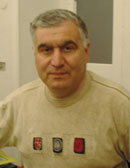 Tahir Behbudov
Tahir Behbudov 